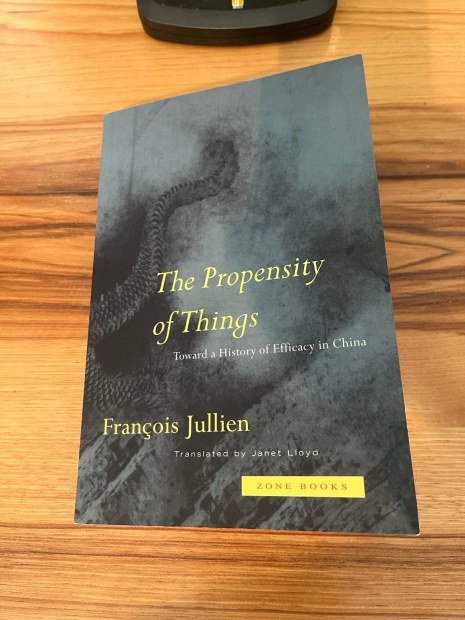Finished “The Propensity of Things” by Francois Jullien. I found it to be a valuable and enlightening work on Chinese philosophy; having studied Greek and Chinese philosophy in my undergrad I found Jullien’s work particularly enjoyable. It’s not a tome and (for a book of philosophy) easy to read. He also uses a unique citation and formatting structure for indicating his primary sources that I thought was effective in keeping an easy textual flow for the reader.
The author discusses the multivarious historical applications of the word shi 势, which I summarize as “situational dynamic;” or, as it applies in the Sunzi, the general’s exploitation of the potential born from the conditions he/she encounters. Shi is the power that results from strategy, configuration, and position; as such, it is the opposite of moral force. This circumstantial disposition is omnipresent in systems ranging from politics to warfare, poetry, painting, literature, and historiology. In short, to know shi is to have a grip on the mechanics of flow that drive the processes of reality.
A principle focus of the book is to establish how military philosophy served as an incubator for key conceptual elements of Chinese philosophy; examples include water cosmology, adaptation, transformation and alternation, names and forms, body as a watershed, body as state/army, heart as commander/ruler/totality, heart abstains from transformation of qi, true power is unseen, self so-ness, self-regulation, and non-preferential decision making.
The author articulates how the Chinese concepts of power, change, and authority are based in arrangement and its efficacious deployment, rather than the Western (Greek) ends and means. He goes further to demonstrate that though there are points of similarity between yinyang and Aristotelian thought, the two systems of reason share little in common other than that both begin with change as the result of the interaction between poles.
As he writes, the anti-idealist Chinese position rejected the metaphysical gulf between matter and form, and therefore the Greek idea of matter-as means. Greek thought introduces order from the outside in, whereas in yinyang thought reality is considered to arise intrinsically from the configuration of an unfolding process inherent to the systems of Heaven and Earth that are both self-configuring and the source of materialization (not matter). In this system, order is conceived as lying within becoming; in other words, they favored process science and systems thinking over deductive reasoning and abstraction.
Yinyang thought is less concerned with abstraction and enigmatic fancy of a Prime Mover than it is with pragmatism and functioning in the real world; as I am fond of saying, a farmer (farmer is also a general) has no leisure to entertain nonsense and or movements from the abstract to the real. The clinician in me must concur with the philosopher-general Wu Qi that certitude is the greatest of all virtues; when working with a patient, why else be there?
